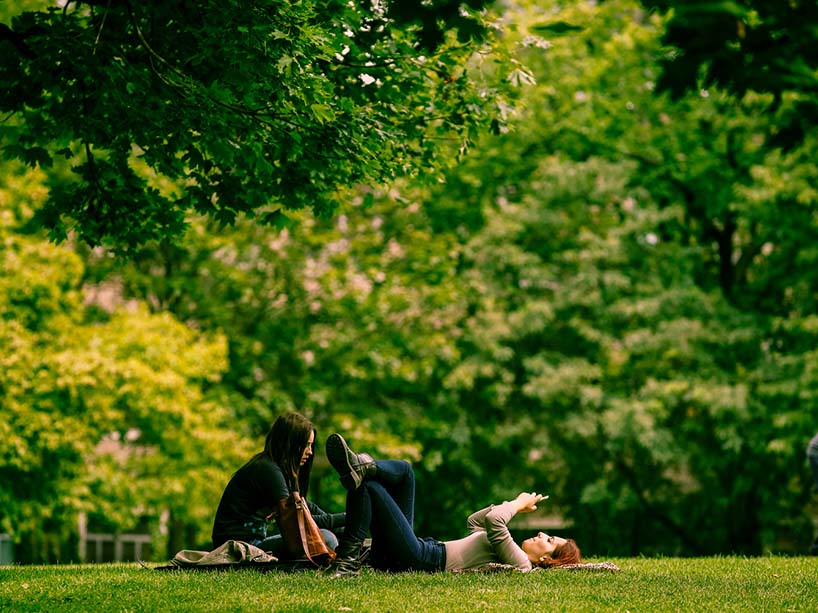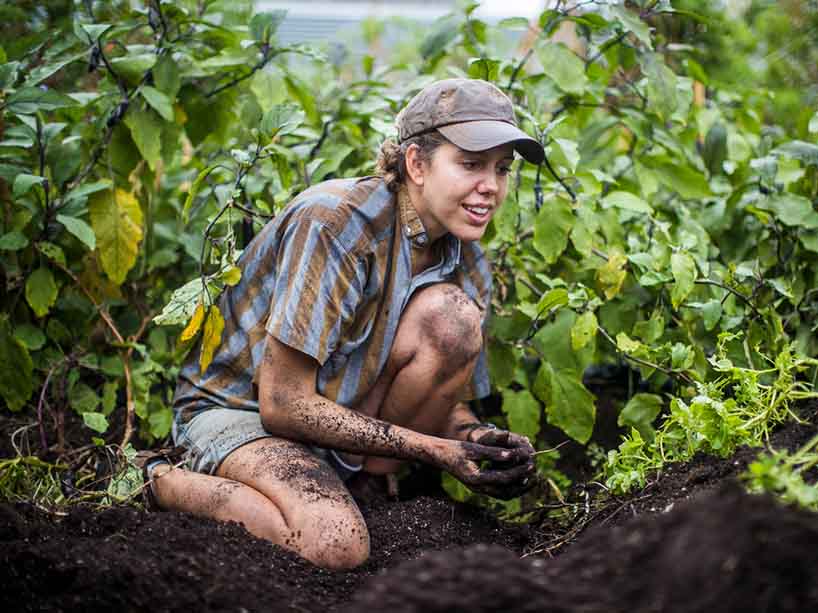Tips for time outdoors: How exposure to nature positively affects mental health

Getting outdoors has many benefits including for mental health and well-being, and can support student academic success as well.
You don’t have to be a tree-hugger to know how restorative and even therapeutic green spaces can be. Time spent outdoors in nature can powerfully impact youth mental health, academic performance, and well-being.
Deena Shaffer, coordinator of Student Transitions and Retention, Student Wellbeing, at Toronto Metropolitan University, shares the benefits of increasing exposure to green spaces to help promote youth mental health and well-being.
Restorative value of green spaces
One of the social inequalities highlighted by the pandemic was access to green space, with disadvantaged communities disproportionately affected, exposing them to increased physical and mental health risks. Green spaces can be viewed as public health assets (external link) , increasing resilience during times of crisis.
The opportunity for physical exercise is one of the main benefits of access to green space, but just being in nature is on its own a very healing experience, says Shaffer.
The benefits of nature are not just well-documented, but perhaps now ubiquitous. Time spent immersed in nature restores our capacity to pay attention, heal after stress and injury, and reignites a sense of awe and wonder.

Green spaces can be viewed as public health assets, increasing resilience during times of crisis and providing health benefits that go beyond opportunities for physical exercise, and extending to mental health and well-being.
Outdoor access and youth development
Shaffer says the connection between mental health and access and encouragement to immerse in natural settings, particularly for youth (15-24 years old), should be more widely promoted.
Pandemic disruptions for young people have come at a time in a student's development when health-aware and coping skills are picked up and practised, when physical activity becomes cemented as a healthy lifestyle habit, and when mental illness most significantly appears.
Shaffer outlines the benefits of time spent in nature and provides tips for taking advantage of green spaces this academic year to help boost student mental health and healing.

Accessing outdoor spaces and natural settings has positive advantages for youth development, improving coping skills, cementing healthy lifestyle habits and more. Photo credit M. Dempster
The benefits of green spaces
Sometimes, we might think of movement, a walk or stroll around the block, or sitting in a park as somehow taking away from our school work. But movement, particularly in nature, only benefits our performance in school. Here’s how being in nature can help you:
Improve focus
Moving in nature helps restore our capacity to focus, whether for a lecture or assignment. It's called Attention Restoration Theory, and you don't have to do anything extra. Simply moving outdoors, letting your mind and senses wander and become fascinated, increases our capacity for concentration.
Build relationships
Moving in nature helps us build relationships. We can build new friendships and connections, but instead of the awkwardness of first conversations, and wondering where to look and what to talk about and how to respond, relationship-building in nature lets us move side by side, noticing and remarking upon what we sense--a bird's song, a summer flower, a cloud formation, the weather.
Problem-solve
Moving in nature helps us think and problem-solve creatively. When we're stuck on a solution, writing an essay, or trying to come up with an idea for a project, one of the best ways through it is to move outdoors. Outdoor movement frees up our cognitive abilities to create new connections.
Reduce stress
Moving in nature reduces all markers of stress--it's called Stress Reduction Theory. Our fatigue reduces, our experience of overwhelm is soothed, our mood uplifts, our experience of interconnection grows, our perspective shifts, and all of the physiological indicators of stress diminish.
Do it your way
There is no singular way to move. Maybe you're living with a disability or healing from an injury. It's really about taking up space and experiencing embodiment in the ways that nourish your sense of safety and wellbeing.
It’s simple
Moving outdoors is free--there's no sign up fee, no membership cost, no fancy gear. Just show up and move!
Tips for spending more time outdoors

Spending time outdoors with others can help to build connections and foster friendships.
- The Quad provides a green space in the centre of TMU campus, a great place to relax, study, play casual sports, or hang out with friends.
- The Urban Farm offers a variety of educational programming and hands-on training for the TMU community throughout the growing season, including tours, field visits, in-person training and workshops.
- Student Wellbeing will be offering Mood Routes, an accessible, campus nature-walking program.
- TMU Athletics (external link) offers a number of outdoor sports like CrossCountry, Dragonboat and Ultimate Frisbee.
- Inviting the outdoors in by keeping plants in your home can be a way to appreciate nature inside.
Access to nature is vital to our mental well-being and overall quality of life, providing space to destress and relax. Green spaces furnish opportunities for physical activity, socialization and help to alleviate some of the mental health impacts of pandemic isolation and stress. It can also provide much-needed respite and mental and emotional restoration throughout the year.
So, make a concerted effort to get outside the next time you’re feeling overwhelmed, and be proactive about making time to enjoy nature.
Related stories: